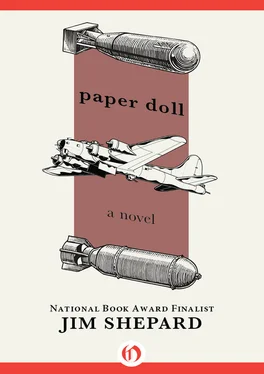Ball was evidently thinking the same thing. He said, “Man, if we’re incompetent, what does that make them? ”
Everyone was talking about Berlin. Bryant was able to eat all of his hash and none of the eggs. Beside him Lewis and Snowberry ate without speaking. Bean sat before his plate and did not move. Piacenti drank three mugs of coffee and went back for more.
In the briefing room there were not enough seats, and men were leaning against the walls. One young staff sergeant who looked as if he were wearing his father’s jacket sat on the floor next to the door, his eyes half closed and his mouth ajar. The extra people crowded toward the front, peering closely at the sheet covering the mission board in an attempt to see through it.
“The pulley,” Snowberry said. They were squeezed into the second row. The pulley was near the top. All the yarn had been used. They looked at the bare metal spindle with the hope there had been some mistake. “Christ, where’re they sending us?” Lewis asked. “Arabia?”
It took some time to get everyone quiet enough to begin. “I know a guy,” Lewis said wistfully, “flew fifty missions, two whole tours, and never fired a shot.”
The Ops captain stepped up to the sheet. He put a hand on it and looked at them.
“Can you imagine milking something like this?” Snowberry said under his breath. If they could have killed the Ops captain at that moment, they would have.
The sheet was pulled back. The red yarn went all the way through Germany nearly to the Austrian border.
The room was in total shock. The Ops captain who’d pulled the sheet stood quietly beside it, hands clasped, and leaned forward and gazed at it again, as if wondering if the silence were due to an empty board.
The room exploded. There were protests and loud exclamations. One group was booing. Everyone was shouting questions. Bryant sat silently and thought, What idiot dreamed this up? Lewis said clearly through the noise, “Look at the map. Their entire fighter strength has to be within eighty-five miles of that course. How many fucking fighters do you think that is?”
Snowberry was white. “How can we go that far without fighter escort?” he asked.
It took five minutes to calm everyone down. The briefing continued.
“ Schwein furt,” Snowberry said. “I’ve never heard of it.”
A major whom Bryant hadn’t seen before centered himself beside the screen, eclipsing the captain. “The primary targets,” he said, lowering his volume as the crews quieted, “are the three major ball-bearing factories at Schweinfurt.”
Bryant and Bean looked at one another. What was next? Zipper factories?
“Bomber Command tells us that this is the most important target ever attacked by aircraft. This is the big deal, gentlemen, as you can see.”
He pointed to the board, as if there were something further to emphasize. “Now this is a revolutionary way of employing the strategic bomber, and you men are the first to be a part of it; we will mount a sustained attack against one especially vital industry, rather than spreading ourselves thin over a number of targets. Schweinfurt is what we call a bottleneck target, gentlemen. Nazi fighters — and a whole hell of a lot of other things in Germany — run on ball bearings. Hundreds of ball bearings, thousands in one plane alone. Seventy-six percent of those ball bearings, seventy-six percent of all the bearings in Germany, come from Schweinfurt. Get Schweinfurt and you get seventy-six percent of the bearings that make the Focke Wulfs and Messerschmitts go. I suspect that that is an item of personal interest to you men.”
“Ha, ha,” someone said from the back of the room.
The major continued.
“There will be, simultaneously, a mission against the Messerschmitt factory at Regensburg.” He pointed.
“Probably the second most important target ever attacked,” Piacenti whispered.
“The second most important target ever attacked by aircraft,” the major said. A sheet was pulled back from a second smaller board and the Regensburg mission was outlined. The men stared. The number of planes now involved in this joint mission was staggering.
“The Messerschmitt factory produces some three hundred fighters a month, a full thirty percent of the total. The idea, gentlemen, is to break the Luftwaffe fighter arm. To break it for you men, and to break it in preparation for the planned invasion of Europe.” He paused. “I don’t think I’m giving too much away to tell you men that,” he said.
“Couldn’t we just keep going after airfields, like Le Bourget?” Piacenti asked quietly.
The screen came down. They were shown photo blow-ups. They were given details of the three targets. The impossible German names for the factories they shortened to KGF, VKF 1 , and VKF 2. They learned that Kugel meant spherical in German.
They felt worse receiving elaborate explanations. It seemed un-military and un-Army for their commanding officers to be so willing to confide in them. They did not expect to know precisely why they went on missions. There was not going to be a vote. They nursed the possibility that they went on some of the missions because somebody somewhere simply felt like sending them. The major spoke again of the critical concentration of ball bearings.
“We got ’em by the colones, ” Piacenti said.
“Have you ever heard such dog shit in all your life?” Lewis said. “After we do this, all the machines stop. Germany surrenders.”
But they were incompletely focused on the importance of the targets. What most interested them was the length of yarn line. Their fighter escort range, drawn in an arc through the Netherlands with a blue pen, covered a forlorn fifth of the distance.
The line-up of formations and squadron positions was still concealed. It made a great deal of difference in the defensive boxes whether they were in the center, or on the leading or trailing edges, where the heaviest casualties were.
The crews were waiting for that unveiling. They had quieted and sat in orderly rows and everyone behind Bryant looked too young. The crew of Murder, Inc. had that stenciled over their left front pockets. Bryant was reminded of a school assembly.
One of the Murder, Inc. gunners, a skinny Polish guy named Skink or Strink or something like that, caught Bryant’s eyes with his own. “It just goes to show you,” he said, across the intervening row, “how important the little ball bearing is to our mechanized world.”
Bryant stared at him a moment longer, and turned back around.
“Who is that guy?” Lewis asked.
“Now we’ll talk about the opposition,” the major said.
He pointed to concentrations of black X’s — their symbols for German airfields — lining the yarn route, little visible manifestations of bad news. “Men, we’re going to be straight with you. There’s no hiding the fact that these raids are going to be hazardous.”
“That’s why you’re going to be straight with us,” Snowberry said audibly and bitterly.
“Mission planners have been able, as you can see, to choose routes avoiding the worst of the flak areas, and both targets have never been attacked before, so they’re believed to be lightly defended.” He indicated the blank spaces at the bottom of the map surrounding Regensburg and Schweinfurt. “In addition, Bomber Command has planned diversionary raids on German airfields at Bryas, Lille, and Poix, and the railway yards at Dunkirk and Calais. We’ve never even flown this far into Germany before, so they’re obviously going to be surprised.” His pointer stopped and tapped along the yarn up near the Dutch border. “The problem is that fighters are obviously going to be the danger of the day. I’m not going to mince words. We’re going to be flying through the most heavily defended sectors of the German Air Defense and deep into their homeland.”
Читать дальше












